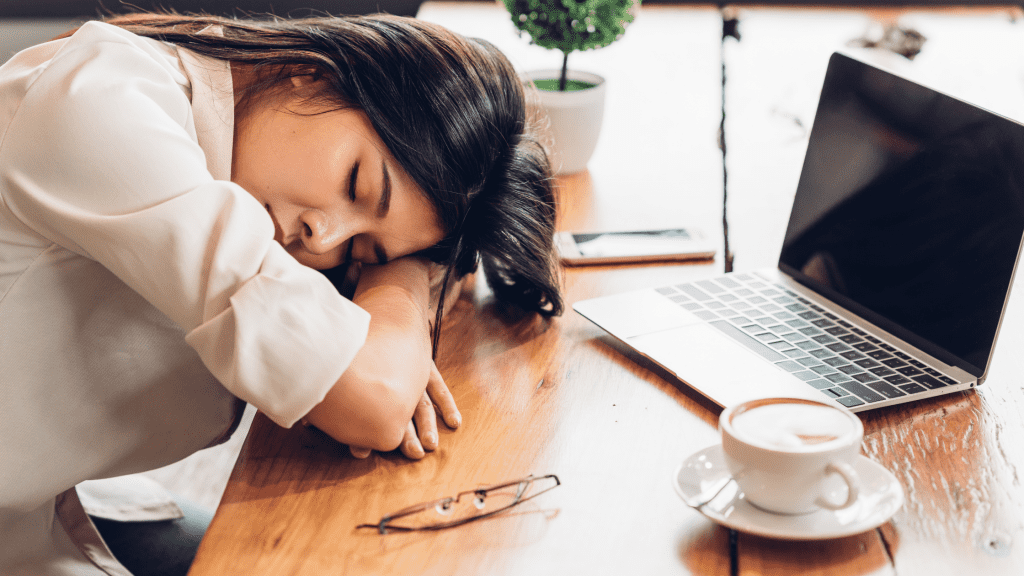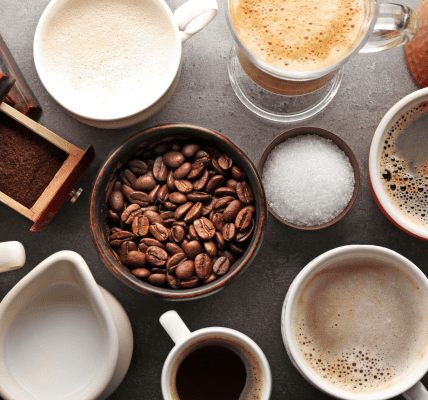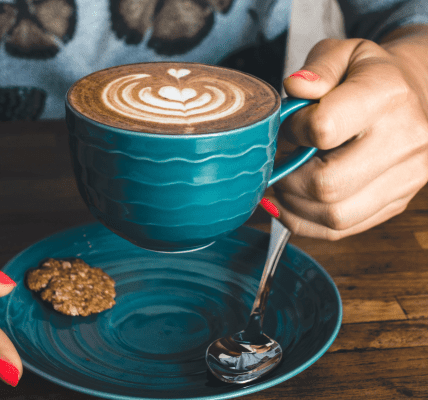There’s something incredibly refreshing about the first whiff of coffee in the morning – or the office cafeteria during the afternoon. But the aroma isn’t enough to wake you up – and you may find that coffee doesn’t wake you up, leaving you to wonder why that is.
Many people think of coffee as a magical energy booster. But its wakeful impact can be low due to your body’s response to caffeine. It might also be your day-to-day exhaustion, sleep patterns, genes, or caffeine tolerance. Drinking coffee at the wrong time might be another reason you can’t feel its effect.
Read on to know why you aren’t getting that caffeine kick required to wake you up, and – and how you can combat most of these causes.
Impact of Caffeine on Wakefulness

Impact of Coffee on Sleep and Wakefulness
Table of Contents
Coffee is one of the most popular drinks to stay awake, energetic, and focused – due to a component called caffeine. It is similar in structure to the neurotransmitter Adenosine. So caffeine can bind to the receptors of Adenosine and block this neurotransmitter.
Adenosine is responsible for making you feel sleepy. So, by blocking it, caffeine tricks your brain into feeling energetic. It also prevents the hormone Dopamine’s reabsorption, prolonging the neural excitation it causes. Thus, coffee makes you feel more awake.
Common Misconceptions About Coffee and Wakefulness
As a psychoactive substance, coffee is largely trusted for a quick boost of energy and cognitive functions, especially in a sleep-addled state. But the effects of caffeine are only temporary. You must remember that coffee is not an actual source of energy.
You may try to wash down all your tiredness after a few sleepless nights (and days) with coffee. But it is not a miracle cure for low energy or the effects of long-term sleep deprivation. It can neither substitute restorative sleep nor cause long-lasting alertness.
Depending on coffee can create adverse or opposite reactions. Regular and excessive coffee consumption can mess with your sleep cycle, make you immune to its effects, and even make you tired, based on your body, lifestyle, and genes.
Why Can’t Coffee Wake Me Up? Uncovering the Mystery
Every person’s body reacts to coffee differently. After a few sips of coffee, some people exude the energy as Snow White in the morning. Then why do you feel like Sleepy Dwarf even after loading up on coffee to your brim?
There could be plenty of reasons why caffeine doesn’t affect you. It might be your genes, lifestyle, coffee habits, health conditions, and more. So let’s take a look at these individually.
1. Timing of Consumption
Are you drinking your coffee right after waking up? Do you need a tall mug on your drive home from work in the evening? Both might be terrible mistakes. Here’s why –
Drinking Coffee Too Early
When you wake up in the morning, there’s a surge in the cortisol levels in your body. It tries to wake you up and fight off the effects of Melatonin that keeps you asleep. A dose of caffeine doesn’t help wake you up at this point.
Instead, it may leave you feeling jittery early in the day. And we all know that anxiousness is not good for attention. As the effect of caffeine starts to wear off, you feel tired due to sleep pressure building up in your body.
Drinking Coffee Too Late
Caffeine can stay in your system for 6-10 hours, during which it continues to block Adenosine from binding to its receptors and prevents sleepiness. If you drink coffee too late, this alertness will interfere with your nighttime sleep.
However, the Adenosine buildup in your body doesn’t just go away. When this Adenosine buildup starts to surge back, you again feel sleepy. And you will likely feel the need to rest during the daytime the next morning.
Solution –
The ideal time for your first cuppa is a few hours after waking up, preferably 9.30-11.30 am. Follow it up with small bursts of coffee every half an hour instead of gulping down one tall glass of coffee. Also, make sure not to drink coffee past 3-4 pm.
2. Caffeine Amount
You may drink mugs of coffee and yet feel no effect if there isn’t enough caffeine in the drinks. But wait! Did you know that too much caffeine can also fail to wake you? Here’s how –
Too Little Caffeine
Different brews have various levels of caffeine, with brewed coffee containing the highest caffeine content. It is followed by espresso or espresso-based drinks with double shots – and instant coffee.
Meanwhile, single-shot espresso and coffee drinks with many additives like creamers and syrups are low on caffeine, with almost no caffeine in decaf. Plus, low-quality coffee can cause lethargy, especially if it has mycotoxins.
Caffeine Tolerance
One major misconception about caffeine is that consuming more has a stronger effect. But too much caffeine can lead to overstimulation, leaving you more tired later. Plus, it can lead to caffeine tolerance.
When caffeine attaches to the Adenosine receptors, the brain thinks there aren’t enough receptors. This boosts receptors in your system. Over time, your normal dose of caffeine won’t be enough to keep you awake.
Solution –
Determining the right caffeine dosage your body needs is key to experiencing its effects. It can be between 50 mg and 400 mg. But first, you can go on a caffeine detox by slowly weaning off coffee. You can try a mix of decaf and regular coffee first.
Then, gradually cut off coffee completely and stay away from other caffeinated drinks like tea, soda, and energy drinks. Then, gradually increase the caffeine dosage to see when it hits the mark. You can perform such caffeine cycling frequently.
3. Insufficient Sleep
Your body might not get enough sleep due to your lifestyle or insomnia. So nothing you do can keep your desire to hit the pillow – including coffee. Here’s why –
Sleep Deprivation
Training yourself to need less sleep isn’t viable in the long run. Your lifestyle may rob you of a consistent sleep schedule or duration – thanks to all-nighters, jet lags, and more. Sleep deprivation leads to cardinal disruptions.
Things get even worse when this goes on for months. That’s called chronic sleep deprivation, and it’s detrimental to your body and mind. At no point can coffee reverse the tiring side effects of sleep deprivation.
Insomnia
If you are an insomniac, i.e., you have a sleep disorder where you cannot fall or stay asleep, you will be left with constant daytime fatigue. Coffee will fail to improve your response time and focus caused by it.
There’s a lot of controversy regarding whether or not coffee can cause insomnia. While drinking coffee can’t directly lead to insomnia, its stimulating effects can certainly worsen insomnia symptoms.
Solution –
Focus on getting at least 7 hours of sleep daily, and train yourself to follow a fixed sleep schedule. You should make an overall change to your routine to get sufficient rest. You can try plenty of at-home remedies, like yoga and meditation.
Also, steal power naps of 10 minutes whenever possible. Try to have a cup of coffee at least half an hour before you usually experience an energy drop. You should also consult a doctor to manage sleeplessness and insomnia.
4. Drinking Habits
How you drink your coffee – brewing style, additives, bean types, etc. – influences its impact. And changing your java habits may also change its effects. Here’s how –
Change in Beans and Brew
Coffee mainly comes from two types of beans, Robusta and Arabica. Robusta has twice the amount of caffeine as Arabica. So if you’ve recently switched to Arabica coffee, you’ll fail to experience the same alertness as you did before.
Coffee brands often use a mix of the two types of beans. So check if you have switched to a brand with more Arabica bean grounds than your previous brand. Changing your brewing method may also lead to less caffeine per cup.
Sugar and Dairy
If you have recently started adding sugar to your coffee, you may experience a sugar crash. The sweetener can boost insulin production in your body and reduce blood glucose. You’ll feel sleepy instead of awakened.
Adding dairy to your coffee might also cause drowsiness. This results from an amino acid called Tryptophan. Though the amount of Tryptophan in milk is not high, it produces enough Melatonin to counteract caffeine.
Solution –
When you pick your coffee, check the brand and beans they use. Premium brands will usually provide pure coffee grounds made from Arabica beans with no impurities. Also, avoid sweeteners and dairy-based creamers to enjoy the full effect of caffeine.
5. Health, Nutrition, and Lifestyle
How you live, what you eat, your medical history, etc., can largely impact your energy levels. The level of fatigue they generate can render caffeine ineffective. Here’s how –
Lifestyle
Your lifestyle can be one of the major reasons you are always tired – even in the morning. Do you live a sedentary life, stuck in one place, with no exercise or sun and air exposure? Then coffee will fail to wake you.
Other lifestyle issues can further contribute to your constant tiredness. If you smoke cigarettes or drink alcohol regularly, such habits can inhibit caffeine’s effects, leaving you tired and sleepy.
Tiredness
Coffee works as a stimulant by preventing the body from feeling tired. But if you are exhausted, to begin with, it means Adenosine is already attached to its receptors. So, there’s no place for caffeine to work its magic.
You may experience exhaustion as you’re physically or mentally overworked – or due to energy dips caused by your circadian cycle. Or, you might have an acute case of chronic fatigue syndrome. Coffee can’t reverse the feeling once it sets in.
Mental and Physical Conditions
Staying in top physical condition is of utmost importance if you want to be brimming with energy. Any form of sickness or health issue causes cellular stress, and your body craves sleep to get a chance to recover.
Mental health conditions like anxiety and depression can lead to chronic fatigue. Even if your stress and gloom aren’t pathological, you can still crave rest. In such situations, caffeine can’t work. It can spike stress and alertness, making you sleepy.
Medications and Supplements
Some medicines mess with the way your body processes and releases caffeine. So its stimulating effects may be delayed and cause agitation rather than focus. These include medicines like birth control pills, beta-blockers, antibiotics, etc.
Plus, caffeine can’t reduce the effects of sedatives, including psychiatric medicines. Some medicines and supplements contain caffeine, and lead to cross-tolerance. As a result, you become immune to the stimulating effects of caffeine.
Hormonal Imbalance
Caffeine intake and hormonal imbalance can cause a vicious cycle in your body. Caffeine can increase estrogen, epinephrine, and cortisol. Caffeine’s stimulatory effect is no match for the stress and fatigue caused by these hormones.
Also, if you already have high Progesterone Melatonin, Serotonin, etc., you’re likely to feel tired already. So, if you drink coffee to battle hormone-induced fatigue, you’ll not experience the energizing effect you want.
Diet and Nutrition
Let’s go back to elementary school science lessons. Food is the fuel for your body. And a balanced diet, complete with complex carbs, good fats, proteins, vitamins, and minerals, is a must to keep your energy levels high.
Unfortunately, coffee doesn’t fall within any of these macronutrients and is not a source of energy. So no matter how many coffee shots you take in a day, you won’t feel awake if your body doesn’t have enough fuel to run on.
Dehydration
When you don’t drink sufficient water, you may experience fatigue, headaches, dizziness, etc., thus counteracting the effects of coffee. You may think that coffee itself is a liquid beverage. Then shouldn’t it hydrate you?
Caffeine is a diuretic, i.e., it increases the production of urine. So, if you are already dehydrated, caffeine might dehydrate you. This is especially true if you drink small shots of coffee with low liquid content, like espresso.
Solution –
Besides proper rest, you need sufficient exercise to get sun exposure and enhance blood circulation to feel awake. Complement it with a balanced, nutritious diet and plenty of water. And stay as far away from alcohol and nicotine as possible.
Also, consult your physician regarding your medicines and health conditions that might make you chronically tired. Your physical and mental health is crucial for keeping you energetic and preventing conditions from rendering caffeine useless.
6. Genetic Response
You might not be experiencing the full effects of coffee because you are genetically hyposensitive to caffeine – or lack the correct receptors to bind caffeine. Here’s how –
Fast Metabolism
One of the major genetic reasons you might not be feeling awake after drinking coffee is hyposensitivity. The enzyme CYP1A2 helps your liver metabolize caffeine. Your DNA sequence may cause your body to produce more CYP1A2.
As a result, you will metabolize caffeine quickly. The same can also be triggered by the gene AHR which can induce CYP1A2 to boost the metabolism of caffeine. This can cause low sensitivity – or no sensitivity – to caffeine.
Wrong Receptors
Another genetic factor that may lead to a low response to caffeine’s awakening effects is the type of Adenosine receptors. Your brain may have receptors that are unresponsive to caffeine. As a result, it simply slides away.
Since the molecules cannot bind to the receptors properly, they fail to block Adenosine, which eventually leads to tiredness. Thus, if your brain doesn’t have the right receptors, coffee will fail to wake you up.
Solutions –
Genetic caffeine hyposensitivity is hard to combat. After all, there’s very little you can do to change how your body is wired. Instead, you can focus on having a healthy lifestyle and finding alternative energy sources, including chicory coffee and herbal tea.
The Joy of a Stimulating Cup of Coffee
Final Words: Rediscovering The Joy of Java
There are many reasons why coffee can’t wake you. Remember that coffee only induces a temporary feeling of alertness. And, when combined with poor lifestyle, health conditions, and drinking habits, it can be ineffective – and even worsen your fatigue.
So, to enjoy coffee’s wakeful effects, you must focus on having a healthy and active life. Maintain a proper balance of rest and nutrition, and ensure that your body has access to real sources of energy. That way, you can enjoy coffee for its rich flavors – without depending on it to keep your eyes and mind open.



